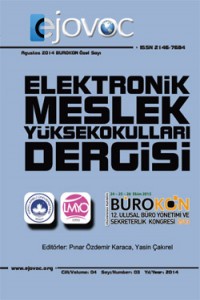Öz
Competition is at its highest for talented staff in the transition from industrial production society to information and consumption society. Information society is seen as an economic phase in which information is considered to be a production factor, life-long learning is inevitable, and information technologies occupy the foreground. In the ever smaller world with these advances in information technologies, competition has grown between nations and organizations. This has resulted in significant competition in the recruitment of talented workers and differences in the workforce market where, traditionally, candidates have been the sellers and businesses the buyers
Anahtar Kelimeler
Talent talented worker talent management career management human resources management
Kaynakça
- Altınöz, M. (2009). Yetenek yönetimi, Ankara: Nobel Yayın Dağıtım.
- Altıntaş, N. (2007). Yetenek yönetimi nedir?, http://www.kobifinans.com.tr. (Erişim Tarihi, 31.08.2009).
- Cappelli, P. (1999). The new deal at work: managing the market-driven workforce, Boston: Harvard Business School Press.
- Çırpan, H., Şen, A. (2009). İşletmelerde yenilikçiliği geliştirmede etkili bir araç: yetenek yönetimi, çerçeve Dergisi, 52(16), 110-116.
- Doğan, S., Demiral, Ö. (2008). İnsan kaynakları yönetiminde çalışanların kendilerine doğru yolculuk yöntemi: yetenek yönetimi, Adana: Çukurova Üniversitesi Sosyal Bilimler Enstitüsü Dergisi, 17(3), 145-166.
- Filiz, A. (2006). İK’da yetkinlik bazlı performans yönetimi, Elektrik, 90-92.
- Guthridge, M. (2006). The people problem in talent management”, The McKinsey Quarterly, 2.
- Jackson, S. E., Schuler, R. S. (1990). Human resource planning: challenges for industrial/ organizational, phsychologists”, American Physicholojist, 45(2), 223-239.
- Kalaycı, Ş. (2008). SPSS uygulamalı çok değişkenli istatistik teknikleri. Ankara: Asil Yayın Dağıtım.
- Leung, A., Zhang, J., Wong, P. K., Foo, M. D. (2006). The use of networks in human resource acquisition for entrepreneurial firms, Journal Of Business Venturing, 21, 664-667.
- McCauley, C., Wakefield M. (2006). Talent management in the 21st century”, The Journal of Quality & Participation, 29(4).
- Mucha, T. R. (2004). The art and science of talent management, Organization Development Journal, 22(4), 96
- Pepe, M. (2007). The strategic importance of talent management (TM) at the yale new haven health system: key factors and challenges of TM implementation, Organizational Development Journal, 25(2).
- Rothwell, W., J. (1994). Effective succession planning: ensuring leadership continuity and building talent from within, New York, Amacom.
- Tymon JR. W. G., Stumpf, S. A., Doh, J. P. (2009). Exploring talent managment in India: the neglect role intrinsic rewards, Journal of World Business, 45(2), 109-121.
- Wieselsberger, K. (2004). The psychological contract is dead, long live the psychological contract: issues of talent management and retention in the context of the new employment relationship, London School of Economics, August.
Öz
Endüstriyel üretim toplumundan bilgi ve tüketim toplumuna geçerken en yoğun rekabet yetenekli personele yönelik yaşanmaktadır. Bilgi toplumu, bilginin üretim faktörü olarak değerlendirildiği, yaşam boyu öğrenmenin kaçınılmaz hale geldiği, bilgi teknolojilerinin öne çıktığı ekonomik bir aşama olarak görülmektedir. Bilgi teknolojilerinde yaşanan bu gelişmelerle küçülen dünyada, uluslar ve organizasyonlar arasındaki rekabetin boyutlarının genişlediği görülmektedir. Bu gelişmeler geleneksel olarak adayların satıcı, işletmelerin alıcı olduğu işgücü pazarında farklılıkların ortaya çıkmasına, yetenekli elemanların istihdamı konusunda önemli bir rekabet sürecinin yaşanmasına neden olmaktadır
Anahtar Kelimeler
yetenek yetenekli çalışan yetenek yönetimi kariyer yönetimi insan kaynakları yönetimi
Kaynakça
- Altınöz, M. (2009). Yetenek yönetimi, Ankara: Nobel Yayın Dağıtım.
- Altıntaş, N. (2007). Yetenek yönetimi nedir?, http://www.kobifinans.com.tr. (Erişim Tarihi, 31.08.2009).
- Cappelli, P. (1999). The new deal at work: managing the market-driven workforce, Boston: Harvard Business School Press.
- Çırpan, H., Şen, A. (2009). İşletmelerde yenilikçiliği geliştirmede etkili bir araç: yetenek yönetimi, çerçeve Dergisi, 52(16), 110-116.
- Doğan, S., Demiral, Ö. (2008). İnsan kaynakları yönetiminde çalışanların kendilerine doğru yolculuk yöntemi: yetenek yönetimi, Adana: Çukurova Üniversitesi Sosyal Bilimler Enstitüsü Dergisi, 17(3), 145-166.
- Filiz, A. (2006). İK’da yetkinlik bazlı performans yönetimi, Elektrik, 90-92.
- Guthridge, M. (2006). The people problem in talent management”, The McKinsey Quarterly, 2.
- Jackson, S. E., Schuler, R. S. (1990). Human resource planning: challenges for industrial/ organizational, phsychologists”, American Physicholojist, 45(2), 223-239.
- Kalaycı, Ş. (2008). SPSS uygulamalı çok değişkenli istatistik teknikleri. Ankara: Asil Yayın Dağıtım.
- Leung, A., Zhang, J., Wong, P. K., Foo, M. D. (2006). The use of networks in human resource acquisition for entrepreneurial firms, Journal Of Business Venturing, 21, 664-667.
- McCauley, C., Wakefield M. (2006). Talent management in the 21st century”, The Journal of Quality & Participation, 29(4).
- Mucha, T. R. (2004). The art and science of talent management, Organization Development Journal, 22(4), 96
- Pepe, M. (2007). The strategic importance of talent management (TM) at the yale new haven health system: key factors and challenges of TM implementation, Organizational Development Journal, 25(2).
- Rothwell, W., J. (1994). Effective succession planning: ensuring leadership continuity and building talent from within, New York, Amacom.
- Tymon JR. W. G., Stumpf, S. A., Doh, J. P. (2009). Exploring talent managment in India: the neglect role intrinsic rewards, Journal of World Business, 45(2), 109-121.
- Wieselsberger, K. (2004). The psychological contract is dead, long live the psychological contract: issues of talent management and retention in the context of the new employment relationship, London School of Economics, August.
Ayrıntılar
| Birincil Dil | Türkçe |
|---|---|
| Bölüm | Makaleler |
| Yazarlar | |
| Yayımlanma Tarihi | 1 Ağustos 2014 |
| Gönderilme Tarihi | 5 Ocak 2015 |
| Yayımlandığı Sayı | Yıl 2014 Cilt: 4 Sayı: 3 |


